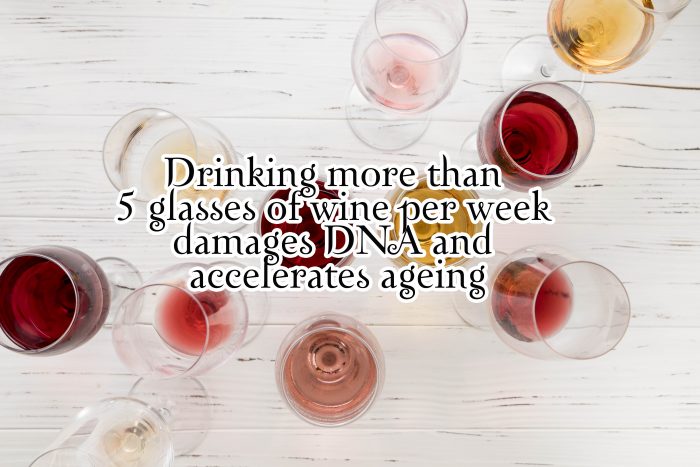British researchers have found that drinking alcohol equivalent to more than five glasses of wine or 8 pints of beer per week damages DNA. Consequence: premature ageing of the body.
In New-Zealand, based on www.alcohol.org.nz information, you’re classed as low risk if you are having between 0 and 15 standard drinks a week, if you’re a man, 0 and 10, if you’re a woman. This means that your drinking comes with some health and other risks but this is less likely. However, defining “some health and other risks” and what people want to risk is not simple. Fortunately researchers continue to bring more accurate information. Now, you can assume that over 5 glasses of wine per week, you’re not safe.
“A glass of wine a day keeps the doctor away”.
This adage, sometimes heard directly from the mouths of our elders, is obviously not validated by science–quite the opposite.
This study, internationally shared among the medical world, was published on Tuesday 26th July 2022 in the journal Molecular Psychiatry. According to scientists from the University of Oxford, wine is not an elixir of youth. Their research attests to the damage observed on the DNA of regular consumers of alcohol.
Specifically, the researchers noticed that the telomeres – located at the end of the chromosomes – had shortened in people who drank more than 17 units of alcoholic beverages per week. This corresponds to more than five glasses of wine or 8 pints of beer.
The result? Premature natural ageing, accompanied by a higher risk of developing age-related pathologies such as Alzheimer’s. “Our findings provide another piece of information for clinicians and patients looking to reduce the harmful effects of excess alcohol,” said Dr. Anya Topiwala, psychiatry expert at Oxford Population Health and lead author of the study, in a press release.
1 unit of wine = 125ml

DNA of 40% of regular wine drinkers damaged
In order to observe the effects of alcohol on DNA ageing, the scientists selected almost 245,000 profiles of Britons from the UK Biobank database. With an average age of 57 years, 51% of the profiles were those of men, and 49% those of women, broken down by alcohol consumption habits. “Most of the profiles studied were those of current drinkers, with only 3% having never drunk and 4% having ever drunk”, reported the Daily Mail.
By comparing the genetic data of former heavy alcohol drinkers with those of current drinkers, the researchers noticed changes in their DNA. 40% of participants who drank more than 17 units per week — more than five glasses of wine or 8 pints of beer — had shorter telomeres. This was not observed in consumers of less than 17 units.
Increasing alcoholic beverages from 10 to 32 units per week was associated with the equivalent of three to 6 years of biological ageing.
The “increased oxidative stress and inflammation” produced by the breakdown of ethanol in the body has been identified as a potential explanation, the statement read.
You may be interested in :
- 10 processed foods to avoid to stay healthy
- How to restore yourself with our detox teas (…especially after overindulging!)
Cell death and Alzheimer’s disease
Located at the ends of chromosomes, telomeres are markers of biological ageing. “Once telomeres become too short, cells can no longer divide and may even die,” the authors explained in the release. A Finnish study published in 2012 in the European Journal of Epidemiology had already shown that alcohol consumption, even low amounts and in middle age, affects telomere length.
And such phenomena are not neutral. “Shortened telomeres have been observed as risk factors for a number of serious age-related diseases, such as Alzheimer’s disease,” said Dr. Topiwala.
This is backed up by a 2019 study published in the European Journal of Epidemiology. The researchers claim that short telomeres are associated “from an observational and causal point of view” with an increased risk of Alzheimer’s disease.
Note that other research, this time published in December 2017, has shown that, conversely, too-long telomeres are associated with cancer risks.



